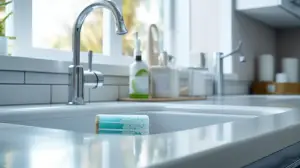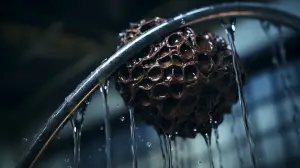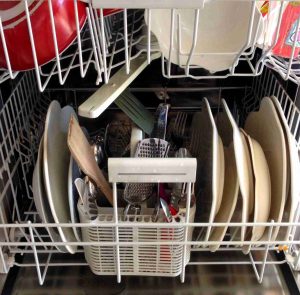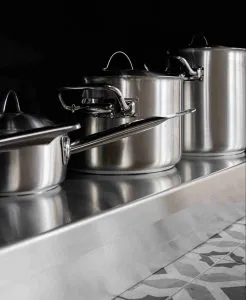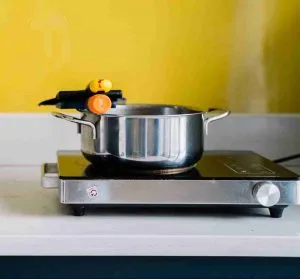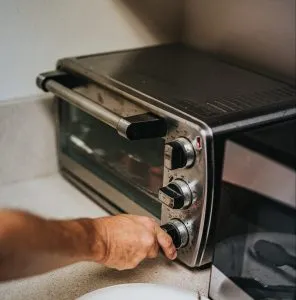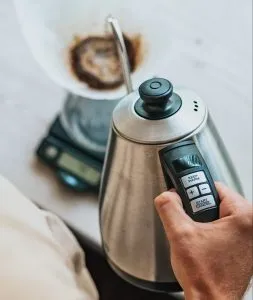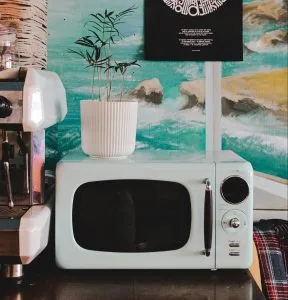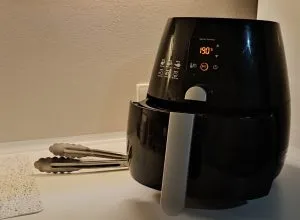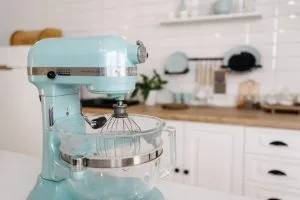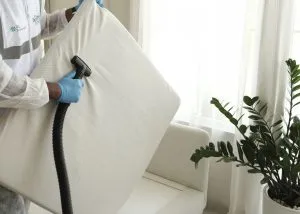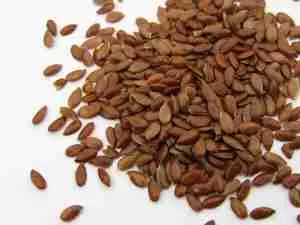Contents
ToggleKey Takeaway:
- Vinegar smells bad due to acetic acid: The strong odor of vinegar is primarily caused by acetic acid, a byproduct of the fermentation process. Understanding the chemistry behind the smell can help you find ways to minimize or mask it.
- Use dish soap or rubbing alcohol to reduce vinegar scent: Mixing vinegar with dish soap or rubbing alcohol can help mask or minimize the smell. These substances can neutralize the strong odor, making it more pleasant to use vinegar in your cleaning routine.
- Create scented vinegar with essential oils, citrus, and herbs: Adding essential oils with antimicrobial properties, such as tea tree or lavender oil, can help create a pleasant aroma when using vinegar. Infusing citrus peels or adding herbs and spices can also enhance the scent of vinegar and make cleaning more enjoyable.
Introduction: Why does vinegar smell bad?
Vinegar’s unpleasant odor can be attributed to its acetic acid content. Acetic acid is a volatile compound that gives vinegar its distinct smell. When acetic acid is exposed to the air, it evaporates and releases its odor. This explains why vinegar has a strong and pungent smell.
Additionally, the fermentation process involved in vinegar production can also contribute to its odor. During fermentation, bacteria convert alcohol into acetic acid, leading to the development of the characteristic smell.
Understanding the chemical composition and production process of vinegar helps explain why it has a bad smell. You can learn more about various odors and their causes, such as the skunk smell in your house, to get a better idea of how smells work.
How to use less vinegar in your cleaner
To achieve this, follow the 4-step guide below:
- Dilute effectively: Mix vinegar with water in the appropriate ratio, ensuring the solution is potent enough for effective cleaning while reducing the amount of vinegar needed.
- Spot application: Use vinegar sparingly by directly applying it to specific areas that require extra cleaning power. This targeted approach allows you to use less vinegar overall.
- Explore alternative ingredients: Research and experiment with other natural cleaning agents that can replace or complement vinegar. This can help reduce vinegar usage without compromising the cleaning effectiveness.
- Optimize cleaning techniques: Focus on improving your cleaning techniques, such as utilizing proper tools and following best practices. Efficient cleaning methods can reduce the need for excessive vinegar in your cleaning solution.
It’s important to note that vinegar may smell unpleasant due to the specific volatile organic compounds it contains. These compounds are responsible for its strong scent.
Making scented vinegar with essential oils

Enhance the scent of your vinegar by incorporating essential oils. Follow these simple steps for making scented vinegar that smells delightful.
- Choose Your Essential Oil: Select an essential oil of your preference, such as lavender, lemon, or rosemary. Ensure that the oil is of high quality and suitable for internal use.
- Dilute the Essential Oil: In a separate container, dilute a few drops of essential oil with a tablespoon of distilled water. Stir well to combine the ingredients evenly.
- Blend with Vinegar: Add the diluted essential oil into a bottle of vinegar, shaking it vigorously to thoroughly mix the solutions. The recommended ratio is one teaspoon of diluted essential oil for every cup of vinegar.
To ensure a well-balanced scent, let the scented vinegar rest for twenty-four hours before using it in your desired application. Now you can enjoy the pleasing aroma of scented vinegar when cleaning or cooking.
Including infusions of citrus and herbs
Adding a little zing and zest to vinegar with citrus and herb infusions can completely revolutionize its aroma and flavor. These all-natural additions give vinegar an uplifting, sensory boost that turns the ordinary into something truly extraordinary. Think about the burst of zesty freshness that citrus fruits like oranges and lemons can provide, or the rich, earthy notes brought in by herbs such as rosemary and basil. This fragrant cocktail of fruit and herb infusion not only enhances the scent of vinegar but gives it a unique character that’s nothing short of irresistible.
Here’s a quick glimpse at some of the incredible infusion combinations you can experiment with:
| Citrus Infusions | Herb Infusions |
| Orange | Rosemary |
| Lemon | Basil |
| Lime | Mint |
These infusions don’t just stop at making your vinegar smell divine – they also impart their distinct flavors, creating a symphony of taste. Citrus gives your vinegar a tangy and fruity kick, while herbs add a savory undertone that harmoniously complements. The end product? A balanced, versatile vinegar that can elevate everything from salads to stews.
The beauty of these infusions extends beyond taste and aroma; they also pack a healthful punch. Citrus fruits are nature’s vitamin C powerhouses, brimming with antioxidants that can bolster your immune system and promote wellness. Herbs, too, have a treasure trove of medicinal properties: take rosemary’s anti-inflammatory effects or basil’s anti-bacterial prowess. Adding these infusions to your vinegar doesn’t just make your dishes tastier, it makes them healthier too.
So, why not give these infusions a go and make your very own aromatic vinegar right in your kitchen? Just drop your chosen fruits or herbs into a vinegar bottle and let them cozy up for a few weeks, allowing the flavors to truly come alive. Once you strain out the solids, voila! You’ll have your very own tailor-made, aromatic vinegar, ready to sprinkle magic into your marinades, dressings, and countless dishes.
Adding lemon juice to mask the vinegar smell quickly
Transforming the potent smell of vinegar into something more palatable is simpler than you might think, and it’s all thanks to the humble lemon. With just four steps, you can quickly neutralize the strong aroma of vinegar and infuse your surroundings with a more refreshing and welcoming scent.
- Choose the Right Lemon Juice: Opt for fresh lemon juice rather than bottled or processed versions. Fresh lemon juice contains more natural oils and aromas, which can effectively mask the vinegar smell.
- Mix Lemon Juice with Vinegar: In a spray bottle or container, combine equal parts lemon juice and vinegar. The acidity of both ingredients helps in neutralizing the odors, while the lemon juice adds a refreshing citrus scent.
- Apply the Mixture: Spray or apply the lemon juice and vinegar mixture directly onto the surfaces or areas that have a strong vinegar smell. Allow the mixture to sit for a few minutes to effectively neutralize the odor.
- Ventilate the Space: Open windows or doors to allow fresh air to circulate in the area. This helps in removing any lingering vinegar smell and replaces it with a more pleasant scent of lemon.
Navigating this simple roadmap will help you swiftly swap the sharp smell of vinegar for the invigorating scent of lemon juice. But, remember, striking the right balance between the two is key to achieving the best results. With this guide at your disposal, you’re well on your way to enjoying a fresh, vinegar-free environment.
Taking things a step further, you could also consider using lemon essential oil. A few drops in a diffuser or mixed with water in a spray bottle can make quick work of any vinegar odors and leave a fresh, lemony fragrance in their place.
The idea of using lemon juice to combat undesirable smells has stood the test of time. Renowned for its antimicrobial properties and delightful aroma, lemon has been a trusted ally in cleaning and deodorizing tasks for generations.
Cleaning tips for dealing with the vinegar smell
When it comes to maintaining an environment that’s fresh and welcoming, knowing how to neutralize the assertive scent of vinegar is a must. Here are some simple yet effective strategies to help you tackle the vinegar aroma and transform your space:
- Proper ventilation: Open windows and doors to allow fresh air to circulate and dispel the vinegar odor.
- Dilute with water: When using vinegar for cleaning, mix it with water to reduce its pungent smell.
- Use lemon or citrus: Incorporate the refreshing scent of lemon or citrus into your cleaning routine to mask the vinegar smell.
- Essential oils: Add a few drops of essential oils such as lavender or eucalyptus to vinegar solutions for a pleasant aroma.
- Baking soda: Sprinkle baking soda on surfaces after using vinegar to absorb any residual odor.
If you are experiencing other types of odor issues, such as your bathroom smelling like rotten eggs, there are similar strategies available to deal with them.
Remember, to keep the vinegar smell at bay, proper ventilation is key even after you’ve completed your cleaning. By embracing these handy tips, you’ll be well-equipped to keep your space smelling fresh and inviting.
Conclusion: Turning cleaning with vinegar into a sensory delight
Transforming the simple act of cleaning with vinegar into an aromatic journey can be achieved with a little understanding and a dash of creativity. When we delve into the ‘why’ behind vinegar’s robust aroma, we unlock ways to create an elevated cleaning experience. The addition of natural fragrances or enchanting essential oils can significantly change the game, turning vinegar-based cleaning mixtures into sensory delights.
So, welcome vinegar’s potential for transformation, and add an unexpected level of joy to your cleaning regimen. Seize the chance to turn an everyday chore into an aromatic voyage that tickles the senses. Make your cleaning routine not just a task, but an experience to savor.
Five Facts About Why Vinegar Smells Bad:
- ✅ Vinegar smells bad because of acetic acid, its main component, which is aggressive and pungent. (Source: Team Research)
- ✅ Vinegar’s strong smell can be overpowering and can quickly attack our nostrils. (Source: Team Research)
- ✅ Cooking varieties of vinegar may smell better than distilled white vinegar and cleaning vinegar. (Source: Team Research)
- ✅ Essential oils can be added to vinegar to mask its smell and add fresh aromas. (Source: Team Research)
- ✅ Citrus peels and herbs can also be infused with vinegar to create scented vinegar solutions. (Source: Team Research)
FAQs about Why Does Vinegar Smell Bad
Why does vinegar smell bad?
Vinegar has a strong smell because of its acetic acid content, which makes it a powerful cleaner. While it may not smell pleasant, the odor dissipates quickly, leaving behind a clean and fresh environment.
What can vinegar be used for in cleaning?
Vinegar can be used to safely remove limescale and rust, deodorize sinks and carpets, and eliminate dirt and grime from various surfaces around the house.
Are there any vinegar varieties that smell better than others?
While distilled white vinegar and cleaning vinegar are the most practical solutions for cleaning, there are better-smelling cooking varieties available. These varieties can help mask the temporary scent of vinegar.
How can I make my vinegar cleaning solution smell better?
You can use less vinegar in your cleaner and add household ingredients like dish soap or rubbing alcohol to improve the smell. Additionally, you can make scented vinegar sprays by adding essential oils or infusions of citrus peels and herbs.
Which essential oils are best for adding to vinegar cleaning solutions?
Some of the best essential oils to add to your vinegar cleaning solution include lavender, cinnamon, eucalyptus, tea tree, peppermint, rosemary, sage, and clove. These oils not only mask the vinegar smell but also have antimicrobial properties.
What is the process for making scented vinegar sprays with citrus peels and herbs?
To make scented vinegar sprays, sterilize a mason jar, fill it with citrus peels and herbs, and cover them with plain white vinegar or mild cleaning vinegar. Let the jar sit in a cool, dark place for 1-2 weeks, then strain the vinegar into clean spray bottles to remove the peels and herbs.
Additional Reading
If you’re interested in learning more about cleaning methods and household maintenance, check out these articles:
- Plumbing a Basement Bathroom: This detailed guide will teach you all about the challenges and solutions when it comes to installing a bathroom in your basement.
- Disinfect Carpet Without a Steam Cleaner: If you don’t have access to a steam cleaner, don’t fret. This article will guide you on how to effectively disinfect your carpets without one.
- How Often Should You Shampoo Carpets?: Keeping your carpets clean is crucial for maintaining a healthy home. Learn about the recommended frequency of carpet shampooing in this article.
- How to Clean Dog Diarrhea From Carpet: If your furry friend had an accident, this article offers practical steps to clean it up and ensure your carpet is spotless.




